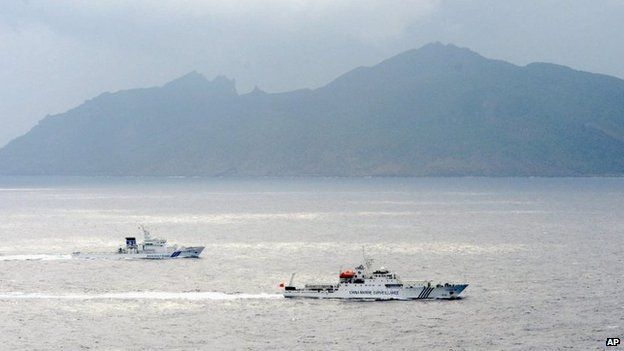Would China fight for disputed islands?
- Published

US President Barack Obama touched down in Japan on Wednesday to hold talks with America's key Asian ally. China's leaders will be watching the visit from afar. Ahead of his arrival, Mr Obama told a Japanese newspaper that a cluster of islands in the East China Sea that both Tokyo and Beijing claim fell under the scope of a decades-old bilateral security alliance.
Known as the Diaoyu Islands in China, and the Senkaku Islands in Japan, the territory is easy to miss on a regional map. This tiny string of five uninhabited islets and three barren rocks lies almost exactly between mainland China and southern Japan.
For decades, Japanese authorities have controlled the islands, prized for their strategic location in the East China Sea and possible oil and gas deposits below. But in the past few years, Beijing has reinvigorated its campaign to assert its historical ownership over a minute piece of territory that's causing huge regional arguments.
China's Communist leaders first disputed Japan's ownership of the islands in the 1970s, but both countries agreed to leave the problem to future generations.
The issue heated up again in 2012, when the Japanese government purchased the islands from a private landowner. Japanese nationalists wanted to develop the islands, Tokyo said. It wanted to halt that plan, partly to placate China. Few in Beijing believed that explanation.
Instead, the change to the status quo gave China an opportunity to exercise its growing political appetites.
"When Xi Jinping came to power, he changed the basic approach of Chinese foreign policy," explains Renmin University Professor Cheng Xiaohe. "From maintaining the status quo to maintaining a low profile to a new approach of doing something."
To the frustration of China's leaders, Japan has not publicly acknowledged Beijing's claim. So, to pressure Tokyo, Beijing stepped up patrols of the area.
Chinese fighter jets regularly fly above the islands, while naval ships sail below.
"If Japan refuses to talk about this problem, China has to cruise around the Diaoyu Islands to assert China's sovereign rights," explains Liu Jiangyong, a professor at Tsinghua University.
Last November, Beijing made a surprise move, declaring new air traffic restrictions in a zone covering the disputed area. Some countries, including the United States, ignored China's rules, but it is all part of the country's long-term strategy, says Dr Cheng.
"China's design [is] to reserve some kind of rights and freedoms for China to take military action if something happens in Diaoyu Islands or some other disputed area," he explains.
'One inch of territory'
Inside China, the government is using another tool - anti-Japanese propaganda - to keep the island issue at the forefront of foreign policy. Even young Chinese audiences are regularly reminded of unresolved tensions dating back to World War Two.
"Shoot Japanese Demons", an online videogame, was released in February by People.com, a government website.
Players choose a so-called Japanese warlord from a gallery of real historical figures and then score points by shooting the chosen person with a gun.
The game is cartoonish, but it's important to ask: is Beijing's campaign all just a game? Would Xi Jinping really go to war for a speck of uninhabited territory? Well, yes.
"Yes, the islands are small, but from Chinese perspective, one inch of territory is big enough for China to fight for," says Dr Cheng.
Ultimately, it's a circular problem. The symbolic value of these islands will continue to rise as long as both countries push to control them.
"If China and Japan had a friendly relationship, military interest in the islands would drop," Dr Liu adds.
Outside the Japanese embassy, security remains tight. Forbidding 4m-high (13ft) walls prevent anyone from looking in, and grim-faced soldiers circle the exterior.
There are many reasons why China and Japan would avoid a territorial war, including rising trade links and the threat of Washington's involvement. But the presence of these guards reminds those both inside the embassy and out that the threat of a serious military confrontation is never far away.